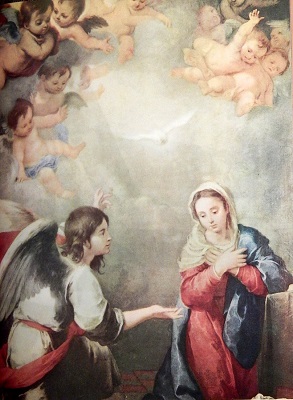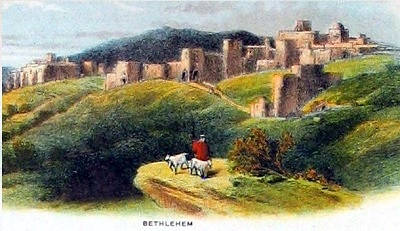Singing from Advent to Epiphany –
Christmas Carols - Part 1
Luke 1:8-17, In the Bleak Midwinter (12/2/2009)
Today we start looking at Christmas carols with "In the Bleak Midwinter." The Jewish calendar has 12 regular months, like Nissan, which is the month Passover comes in, and Teves, which is the month that Hanukkah comes in. It's fundamentally a lunar calendar, but since the lunar month is 29.5 days long and the lunar year rapidly gets out of sync with the solar year, there's a fairly complicated system of leap months. I believe we are currently in the year 5770. The point is that the Biblical writers could have given us the date for every recorded event, but they normally didn't, apparently not considering that the dates were all that important.
One event that we don't know the date of – or even the month or season – is Jesus' birth; however, the Christ mass has been celebrated on Dec. 25 since about the year 350 A.D. Since there's no scriptural basis for the winter, snow, or ice in this carol, our reading is about Zechariah and the angel Gabriel, who announced the forthcoming birth of John the Baptist.
-
In the bleak midwinter, Frosty wind made moan,
Earth stood hard as iron, Water like a stone;
Snow had fallen, snow on snow, Snow on snow,
In the bleak midwinter, Long ago.
Our God, heaven cannot hold him, Nor earth sustain;
Heaven and earth shall flee away When he comes to reign;
In the bleak midwinter A stable place sufficed
The Lord God Almighty, Jesus Christ.
Luke 1:26-33, Ave Maria (12/3/2009)
The first three lines of Ave Maria come from today's scripture reading in Luke. Notice that Gabriel has been sent to Mary as well as to Zechariah, but since she doesn't question his credentials, he's nicer to her.
| Ave Maria | Hail Mary, |
| Gratia plena | full of grace, |
| Dominus tecum | the Lord is with thee; |
| Benedicta tu in mulieribus | blessed art thou among women, |
| Et benedictus fructus ventris | and blessed is the fruit of (thy) womb, |
| Tui, Jesus | (thy), Jesus |
| Sancta Maria | Holy Mary, |
| Mater Dei | Mother of God, |
| Ora pro nobis peccatoribus | pray for us sinners, |
| Nunc et in hora mortis nostrae | now and at the hour of our death. |
| Amen. | Amen. |
Random Walk in a Gallery of Religious Art, Step 68: Luke 1:26-38, Annunciation, by Bartolomé Esteban Murillo (9/3/15)
|
The Annunciation, by Bartolomé Esteban Murillo, excellently shows the humility of the Virgin and the unaccustomed gentleness of the Archangel Gabriel. You may remember that Gabriel was a little short-tempered with Zachariah’s question (Luke 1:19-20); however, he treats Mary kindly and patiently. All that is a good reflection of the scripture. Then Murillo gets carried away with baby angels, of whom I count at least eleven. Now, if you were paying attention during our study of Angels, you will not remember any baby angels. You will remember instead that most angels are scary, hard-working messengers, servants, and soldiers of Almighty God. I don’t know where the idea of these adorable little winged babies came from, nor the idea of the winged anorexic 16-year olds that we see more often today, but I can assure you that neither idea comes from the Bible! The bottom half of the painting is great, though. Previous Step. Next Step. |
 "Annunciation" by Bartolomé Esteban Murillo, from the Gamble family Bible, now in the private collection of Regina Hunter. "Annunciation" by Bartolomé Esteban Murillo, from the Gamble family Bible, now in the private collection of Regina Hunter.
|
Micah 5:2-5a, O Little Town of Bethlehem (12/4/2009)
Bethlehem's primary importance came from its status as the hometown of King David and the prophecy of Micah that the Messiah would come from there. This made sense, because the Messiah was going to be a descendant of David. This is one reason the claim that Jesus was the Messiah met with some skepticism: he was from Nazareth, as far as anybody knew. Nathaniel said, "Can any good thing come from Nazareth?" (John 1:46) After Jesus gave sight to the man blind from birth, one objection made by the religious authorities was, "We don't know where he came from." The blind man sneered, "He gave sight to someone blind from birth, and you don't know where he came from?!" (John 9:29-30) Some people argued that in fact no one would know where the Messiah came from (apparently a minority view), and since they did know where Jesus was from (Nazareth), he couldn't be the Messiah (John 7:27). Ironically, they in fact didn't know where he was from – the little town of Bethlehem.
-
O little town of Bethlehem, How still we see thee lie!
Above thy deep and dreamless sleep The silent stars go by;
Yet in thy dark streets shineth The everlasting light;
The hopes and fears of all the years Are met in thee tonight.
Matthew 1:18-25, Silent Night, Holy Night (12/7/2009)
Quick! What did the angels sing? Not "Alleluia" at all, but reather "Glory to God in the highest." The English "alleluia," as we all know by now, is a direct transfer from the Greek alleluia, which is a transliteration, not translation, of the Hebrew hallelujah. Whenever you see "Praise God!" in your Old Testament, you know that the Hebrew has hallelujah, which means, "y'all praise God!"
-
Silent night, holy night
All is calm, all is bright
Round yon Virgin Mother and Child
Holy Infant so tender and mild
Sleep in heavenly peace.
Silent night, holy night!
Shepherds quake at the sight
Glories stream from heaven afar
Heavenly hosts sing Alleluia!
Christ, the Saviour is born.
Silent night, holy night
Son of God, love's pure light
Radiant beams from Thy holy face
With the dawn of redeeming grace
Jesus, Lord, at Thy birth.
Luke 2:1-7, Away in a Manger (12/8/2009)
Caeser Augustus ruled the Roman empire from 31 BC until AD 14. Herod the Great, who ruled Judea when Jesus was born, died about 4 BC. There is some disagreement about whether Quirinius was "governor" or "governing" in Syria at the time of Jesus' birth; apparently he really was the "governor" at least once, but that time seems to have been too late for the scripture below. Consequently many historians have thought that Luke was mistaken; more recent evidence suggests that Quirinius may have been governor or governing in Syria twice, the earlier time being the one Luke is referring to. Luke has a well-deserved reputation for meticulous accuracy, so I suspect that the historians were missing some of the facts, and that Quirinius was doing something in Syria before the death of Herod.
-
Away in a manger, no crib for a bed,
The little Lord Jesus laid down his sweet head.
The stars in the sky looked down where he lay,
The little Lord Jesus, asleep on the hay.
Luke 2:8-14, The First Noel (12/9/2009)
I love this! The International Standard Version actually has "Army" in this passage, which is what a host is! Have you noticed that the first thing angels say is "Don't be afraid"? That's because many of them are soldiers, and they appear out of nowhere, carrying a sword, sometimes a flaming sword! To be honest, the soldier angels are the least scary of the bunch. No wonder people are terrified. The whole image of an angel as a somewhat anorexic-looking 16-year-old has no basis in scripture.
A few days ago, I got a Christmas postcard with this symbol
and had to have it explained to me. What's a "noel," does anybody know? I didn't, so I looked it up. It means "Christmas carol" (or just "Christmas'). It's not actually what the angel said, but what he did say was a Christmas carol of sorts, and he did indeed say it to shepherds out in the fields. There's a one in four chance that it was winter, as previously discussed.
-
The first Noel, the angel did say,
Was to certain poor shepherds in fields as they lay;
In fields where they lay keeping their sheep,
On a cold winter's night that was so deep.
Noel, Noel, Noel, Noel,
Born is the King of Israel.
Thanks to all who wrote saying they didn't understand the symbol.
Now I know I'm in good company in not seeing immediately that it means "No L," that is, "Noel." And for those of you who did get it, you can take satisfaction in knowing that you are above-average in perspicacity.
More Songs for Advent through Epiphany
Advent Psalms
Christmas Carols - Part 2
Christmas Carols - Part 3
Hanukkah Songs
Epiphany Hymns
Copyright 2009, 2011, 2015, 2016 by Regina L. Hunter. All rights reserved. This page has been prepared for the web site by RPB.
The illustration showing Bethlehem is from the Binns family Bible, now in the private collection of Regina L. Hunter.
Opinions expressed on this page are solely those of the author, Regina Hunter, and may or may not be shared by the sponsors or the Bible-study participants. Thanks to the Holy Spirit for any useful ideas presented here, and thanks to all the readers for their support and enthusiasm. All errors are, of course, the sole responsibility of the author.
Our Sponsors:
St. John's United Methodist Church, "Transforming Lives Through Christ."
2626 Arizona NE, Albuquerque, New Mexico 87110
St. John's Music Ministries now has a YouTube channel, bringing you free concerts and choral music. Check it out!
Traditional worship services are held Sundays at 8:15 and 11:00 a.m. in the sanctuary. Casual worship services are held Sundays at 9:30 a.m. in the Family Life Center. Jazz Vespers are held monthly on the second Saturday at 5:00 p.m. in the sanctuary. St. John's feels especially called to the worship of God and to the service of our neighbors through our music program.
Storm Dragon SoftwareTM
Ducks in a Row, Inc.
This website is supported in part by the generosity of Mrs. J. Jordan.
